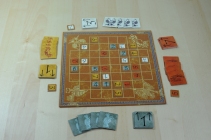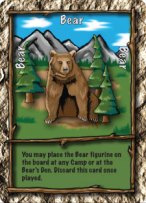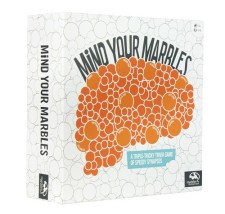Every year five games win the Mensa Select seal, and I have to agree that one or two or three of them really deserve it, and almost always agree that all five are great games, but there are ALWAYS games that I wish had made it, but didn’t. Here I list six games that I really liked for various reasons, but didn’t garner enough votes to earn the seal. Just what is wrong with my fellow Mensans, anyway?!!!? (note: there is nothing wrong with them, it’s a rhetorical question)
Incidentally, I am listing these in order from most to least enjoyable, from my point of view, although – mind you – comparing a two-player game to a party game is apples to oranges so my metric becomes a question of which game I would rather have on hand ‘just in case’.
Fauna (FoxMind Games, $39.95): Do not run screaming when I tell you this is a game about animal trivia, as apparently it was enough to turn off some of my colleagues. There is something so cool about this game that I have never seen in a knowledge based game before, and that’s why I like it so much: it allows you to make an educated guess at an answer, and not just a single answer, but many answers, and all about a single animal. Check out the board, if you can see it: 
(image from http://www.FoxMind.com)
Each turn a new animal card is revealed, and players (2-6 of them) take turns using several color cubes to stake their claims on the board. They may place several cubes on the map in one or more regions in which the animal is a native species, and they may place cubes on the scales below the map showing the height, length, and weight of the average adult animal. More points are awarded for being exact, but some are still awarded for being close – and the balance seemed to be just right. I like it for me because I like animals, I like it for kids because they don’t have to know it outright and can still guess, I like it for fun and I like it for schools and – what the hey – I can even see it as a drinking game! The point is it works for a lot of people, and many ages. I also fully expect that FoxMind will be hard at work making more cards for expansion packs, too. Let’s see how long it takes…
Scavengers (Zombie State Games, $24.99): So…maybe my love of animals is biasing me, I don’t know. In Scavengers, two to four players are controlling the scavengers at the Hamburger family campsite, in hopes of being the first to build an omelet, a kabob, a chili dog, and a s’more. They do this by playing scavenger cards (mouse, fox, skunk, etc) which allow them to steal scraps of food (the ingredients for those meals), or by playing predator (bear, dog, etc) or special cards (cloudburst, late night campers), that have an impact on all the scavengers. The scavengers themselves can also have an effect on each other, and many have special abilities. At the end of a round, the player with the most scavenger points at a campsite wins all the ingredients there. Unless of course another player has more mice there, in which case they get to take something first. But you wouldn’t know that, would you? So get the game – it’s cool!
(images from http://www.Zombiestategames.com)
Flash Point: Fire Rescue (Indie Boards and Cards, $39.99): Add another great cooperative game to the recent popular hits Forbidden Island, Pandemic, and Betrayal at House on Haunted Hill (and more!). This one is based on a fire-fighting theme, and the players band together to rescue a number of victims from a burning house before the house comes tumbling down, or before they lose a certain number of victims; all players win or lose together. (That’s the point of a cooperative game. Duh!) For each turn, a player has a
(image from http://www.indieboardsandcards.com)
number of activity points to ‘spend’ that they may use to move, lift and carry victims, or break down walls and doors – or they may save their energy (so to speak) for the next round and carry some activity points forward. After they have spent their activity, they roll to see what the fire does. Smoke may appear in a new part of the house, or smoke may turn to fire, or fire may superheat and explode; any of these may effect neighboring squares in the house as well. Cubes keep track of structural damage on the house (from the fire and from fire crew axes) and once they are gone, the structure fails and it’s game over! There is a basic game and an advanced game, as well. This was a lot of fun to play because we just barely made it out alive, and it was stressful! I can’t figure out why it didn’t get voted in – except perhaps the instructions may have been too much for some. But don’t let that scare you away, this is a great game for friends and family.
Mind Your Marbles (The Brain Store, $29.99): I may have scared you with trivia before, but this one is serious trivia. But if you DO like trivia…this is a nicely done game. We’re starting to see departures from your basic pull-a-card-and-read-the-question-and-move format (that’s a good thing), and this is a good example. Mind Your Marbles includes a 3-pronged spinner that allows the choice of three categories. When it’s your turn, you have to listen to five questions (three questions!), er, three questions, then give the correct answers in the correct order. If you get every question correct you get three marbles to place
(images from http://www.marblesthebrainstore.com)
on your brain scorepad, for which there is a brain region corresponding to each category (cute detail, no?). If you don’t know an answer, you must pass that answer in the correct manner, because if you get an answer wrong, you get no marbles. And as the old ad goes, marbles are terrible things to lose. Or something like that…(3-6 players, btw)
Epigo (Masquerade Games, $29.99): This was my favorite two player game of the weekend, even better, in my most humble opinion, than the Mensa Select seal winner Coerceo (but, hey, they are both great games!). Note that it is actually a two or four player game (not three!), and there are also 20 variants listed in the rules, which I was NOT able to look at in any detail. Epigo is a simultaneous reveal game, on a 

much smaller scale than perhaps the most well known game of its type, RoboRally. Each player has tiles ranked 1 to 7 and marked with an arrow on one edge, and chooses three to play each round, they are revealed, one at a time – each player revealing their corresponding tiles simultaneously. The largest numbered tiles move first, unless there is a tie, in which case neither tile moves; moving occurs in the direction of the arrow, decided by the player beforehand as the tile was placed. The object of the game is to capture opponents’ tiles by pushing them off the board. In order to push, the number of tiles in a row of the pushing player must be equal to or greater than the number of tiles being pushed. The beauty of this game (and other simultaneous move games) is that, since some planned moves don’t happen because they are blocked, unforeseen outcomes result. There’s a sort of malicious pleasure in watching one’s opponent force his or her own piece off the board…(thankfully, that kind of pleasure begins and ends in board gaming for me).
Masters of Commerce (Grouper Games, $39.99): The very popular game Pit has been around since 1904, consists of players yelling at each other in order to trade properties and corner the market in some commodity, and is loud and fun. Masters of Commerce is not nearly as simple, but it is very reminiscent of Pit – at least there is loudness and there is fun (and, hey, it’s games night! What could be better?).
 (image from boardgamegeek.com)
(image from boardgamegeek.com)
Instead of simply trading cards to try to collect all of one commodity, as in Pit, Masters of Commerce requires players to take one of two roles: landlords or merchants. The good news is that there will be a winning landlord, and a winning merchant. Two winners, hooray! In each round, landlords compete at auction for parcels of land, not knowing how their market values are going to change (but knowing for sure that something will change). Then merchants have a very short period of time to haggle with landlords (all at once; this is where it gets really noisy) for a good deal on rent for those same parcels. Landlords want high rent, merchants want cheap rent. Then the market dice are thrown, rates are adjusted, and payouts are made: first to the merchants from the bank as a return on their investment in their shops, then to the landlords from the merchants for rent due. Each round, more properties are added so the amount of money and haggling only increases…and it just gets crazy!!! This game is a blast. Anyone who like Pit but has yearned for something more detailed, here it is!











